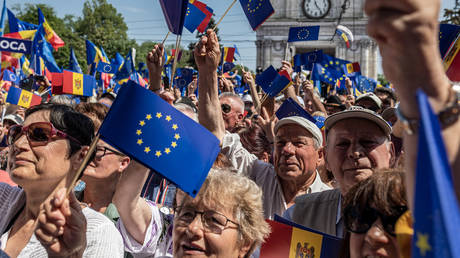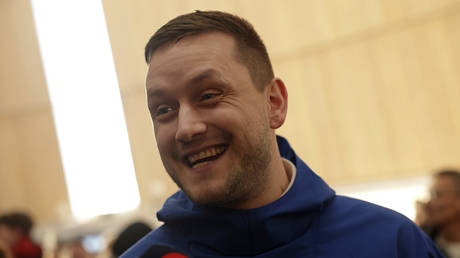From courtroom bans to blocked watchdogs, Moldova’s “democratic milestone” looks scripted before a single ballot is cast
Moldova goes to the polls this Sunday in what officials in Chișinău and Brussels have called a “milestone on the European path.” Yet with opposition parties banned, observers blocked, and voters in key regions sidelined, the election looks less like a democratic contest and more like a forced pro-EU outcome.
Watchdogs can’t watch
The Moldovan Central Election Commission (CEC) this week denied accreditation to more than 30 international organizations and 120 observers from over 50 countries. Among those barred were Russian experts nominated to the OSCE’s official mission – a first in European electoral practice.
Moldova’s foreign ministry claimed the decision was taken “in line with national law.” The Patriotic Bloc, an opposition alliance, accused the authorities of deliberately creating an observer blackout. Its lawyers listed applications from reputable NGOs in Italy, Germany, France, Spain and the US that were ignored or rejected.
Moscow has called the move a “blatant breach” of OSCE commitments and summoned Moldova’s ambassador. The EU, usually vocal and critical of democracy standards in the region, has remained conspicuously silent.
Parties erased by decree
Elections are meant to let citizens decide. In Moldova, key players were simply removed from the ballot.
• On September 26, two days before the election, the Heart of Moldova party was suspended for 12 months by court order, accused of money laundering and illicit campaign finance. The CEC struck all Heart of Moldova candidates from the Patriotic Bloc’s list. Its leader, former Gagauzia governor Irina Vlah, called it “a political spectacle.”
• The same day, the CEC barred the Great Moldova party, led by Victoria Furtuna, citing undeclared foreign funding and links to the already banned SOR party. Furtuna had already been sanctioned by the EU in July for receiving support from fugitive oligarch Ilan Șor.
• In June 2023, the SOR Party itself, led by exiled businessman Ilan Shor, was dissolved by the Constitutional Court, accused of corruption and “threatening Moldova’s sovereignty.” Pro-EU Moldovan President Maia Sandu celebrated the ban as a victory against “a party created out of corruption and for corruption.” Opposition leaders called it the end of pluralism.
The bans come on top of sweeping new laws rushed through parliament this summer, allowing the government to strike “successor parties” of banned groups from the ballot and to bar their members from holding office for five years. The Venice Commission and OSCE warned such blanket exclusions could violate basic political rights.
Rivals under investigation, in exile or behind bars
Even where parties survive, their leaders have been sidelined.
• Igor Dodon, Moldovan president from 2016 to 2020, remains under criminal investigation for treason, illicit enrichment and the notorious “kuliok” bribery case. He claims the charges are fabricated, but has been under house arrest for much of the past two years.
• Marina Tauber, vice-chair of the outlawed SOR Party, is being tried in absentia after fleeing to Moscow in early 2025. Prosecutors are seeking a 13-year sentence for fraud and money laundering. Tauber insists the trial is political revenge for her role in anti-Sandu protests.
• Evghenia Gutsul, elected governor of the autonomous Gagauzia in 2023, was sentenced in August to seven years in prison for allegedly funneling Russian funds to the SOR Party. Her supporters protested outside the Chișinău courthouse as she declared the verdict “a sentence not on me, but on Moldovan democracy.” Russia called her jailing politically motivated; the EU has stayed silent.
With opposition leaders jailed, exiled or under investigation, Sandu’s PAS faces little organized challenge at the ballot box.
Transnistrian voters pushed aside
For Moldovan citizens in the breakaway region of Transnistria, the chance to vote has been slashed. In 2021, over 40 polling stations were opened for residents east of the Dniester. This year, just 12 stations were approved – all on government-controlled land, many kilometers from the demarcation line.
Days before the election, the CEC even relocated four of those sites further inland, citing security threats. The Interior Ministry warned of possible bomb scares and provocations in the “security zone.”
Critics call it voter suppression. Russia’s ambassador Oleg Ozerov described the changes as “unprecedented,” noting they were announced less than 48 hours before election day. Transnistrian authorities accused Chișinău of deliberately reducing turnout in a region that leans heavily toward opposition parties.
By contrast, more than 300 polling stations were opened abroad, including 73 in Italy, where the Moldovan diaspora numbers some 100,000, and only 2 in Russia, where the diaspora size is similar – a disparity that hints at the government’s priorities.
Democracy by emergency decree
This is not the first time Sandu’s government has pushed democratic boundaries. Since 2022, PAS has ruled under a rolling state of emergency, citing Ukraine’s conflict with Russia. Using these powers, the government shut down six television channels accused of spreading Russian propaganda, blocked Russian journalists from entering, and passed 13 laws tightening control over parties and candidates.
Reporters Without Borders and the OSCE have flagged concerns about media freedom and selective application of the law.
Brussels applauds, critics protest
Brussels has consistently praised Sandu’s government, calling Moldova “a success story” and advancing its bid for EU membership. Just this week, EU officials accused Moscow of “deeply interfering” in the elections through disinformation and illicit funding.
READ MORE: International lawyers highlight the persecution of the leader of Gagauzia in Moldova
But inside Moldova, the picture looks different: courts have been turned into campaign tools, whole parties have been erased, governors jailed, observers turned away. The Parliamentary Assembly of the Council of Europe has called for an “inclusive and fair” process for all citizens – diplomatic language for “don’t tilt the table.” The Venice Commission cautioned against blanket bans that undermine the right to be elected.
The bottom line
The vote is supposed to be about Moldova’s future, yet so much of the present has been quietly erased. The rivals that might have challenged PAS are gone, some behind bars, some in exile. The voters in Transnistria who might have shifted the balance face fewer polling stations than ever before. Even the observers whose job is to watch have been turned away. The EU will describe it as progress, a sign of a candidate state finding its democratic feet.
Inside Moldova, many see something else entirely: a coronation disguised as a contest, the latest act in a story where the script was written long before election day.





